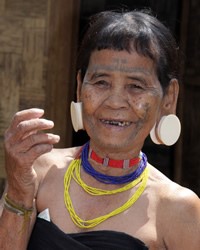Laven in Laos

Photo Source:
Yves Picq - Wikimedia
Creative Commons
|
Send Joshua Project a map of this people group.
|
| People Name: | Laven |
| Country: | Laos |
| 10/40 Window: | Yes |
| Population: | 62,000 |
| World Population: | 100,000 |
| Primary Language: | Laven |
| Primary Religion: | Ethnic Religions |
| Christian Adherents: | 0.00 % |
| Evangelicals: | 0.00 % |
| Scripture: | Translation Started |
| Ministry Resources: | No |
| Jesus Film: | No |
| Audio Recordings: | Yes |
| People Cluster: | Mon-Khmer |
| Affinity Bloc: | Southeast Asian Peoples |
| Progress Level: |
|
Introduction / History
The Boloven or Laven live in a fertile plateau area in southwestern Laos. At an elevation of approximately 3,500 feet, the plateau was once very productive. However, civil wars, poor transportation, and plant disease have combined to destroy coffee, cotton, and tobacco experiments.
The ancestors of the Laven were part of the great Khmer empire that flourished from the ninth century to the thirteenth century. The empire, which encompassed present-day Laos, Thailand, Cambodia, and parts of Vietnam, declined after the Thai and Vietnamese invasions. The center of the Cambodian Kingdom, known as Angkor, was located in the Laven region, where there are ruins dating from the eighth to the twelfth centuries. Laos has since been the scene of numerous battles and the object of political competition between China, Russia, and Vietnam. The Laven are uniquely aware of other ethnic groups due to their contacts with the Lao, Chinese merchants, and European colonists.
What Are Their Lives Like?
Through the agricultural skills of the Laven, an interesting economic network developed that helped them form a trade relationship with other people groups in Laos. They began to cultivate Irish potatoes, which were introduced by the French when Laos was part of French Indochina. Potatoes then developed as an important cash crop and placed the Laven in an economic trade network involving Europeans and Chinese. Now, other tribal groups work for the Laven and the produce is sold to Chinese merchants. They also cultivate rice, maize, peppers, yams and other vegetables. For export they also grow spices such as cardamom and cinnamon.
The Laven are skilled wood-workers, though unlike other people groups in this area, they do not weave or work with metal. Pagodite, a stone used in carving, is also mined in the Boloven Plateau.
The Laven live directly in the path of the southwest monsoon rains and receive more than 160 inches (4,000 mm) of rain, the heaviest rainfall in Laos. Laven villages are generally small. Houses are rectangular, built on stilts and accessed by stairs. Depending on a family's income, a house may have thatch or wooden walls, a thatch or tile roof, and bamboo or wooden floors. Each house has a kitchen garden where they grow vegetables and herbs.
The village is the most significant political unit of Laven society. Each has a village headman who decides important issues. Tribesmen are considered citizens of Laos, but most have no special representation in the government. Family leadership is directed by the eldest male.
The Laven are somewhat unique in their marriage practices in that the couple must also give their consent (in addition to the parents) in order for the wedding to take place. There is no bride price, bride service or dowry required for first marriages. If it is a second marriage, a bride price is given to the second wife's parents. The village headmen perform the weddings and provide a written document to make the ceremony official.
What Are Their Beliefs?
The influence of Buddhism is clearly seen in Laven society, but it serves more as a veneer to their traditional ethnic religions, such as ancestor worship (praying to deceased relatives for help and guidance) and animism (belief that non-living objects have spirits). The Laven believe that ancestral spirits remain actively involved in their lives and should be cared for and fed. They are also strongly influenced by the belief that objects of nature, such as rivers, forests, mountains and trees are inhabited by spirits who can directly influence the courses of their lives.
What Are Their Needs?
There are ample mineral deposits in the basaltic Boloven Plateau that have not yet been exploited and could offer promising opportunities for development. Although the plateau is well endowed with hydropower potential and aluminum ore, there is the chance the Laven people will need to be moved from their homeland.
Prayer Points
Pray that the Laven believers will rise to the challenge of discipling their own people.
Ask the Lord to save key Laven leaders among the who will boldly declare the gospel.
Pray for gospel materials to be translated into the Laven language and widely distributed.
Pray for the Holy Spirit to open hearts to the life-changing gospel.